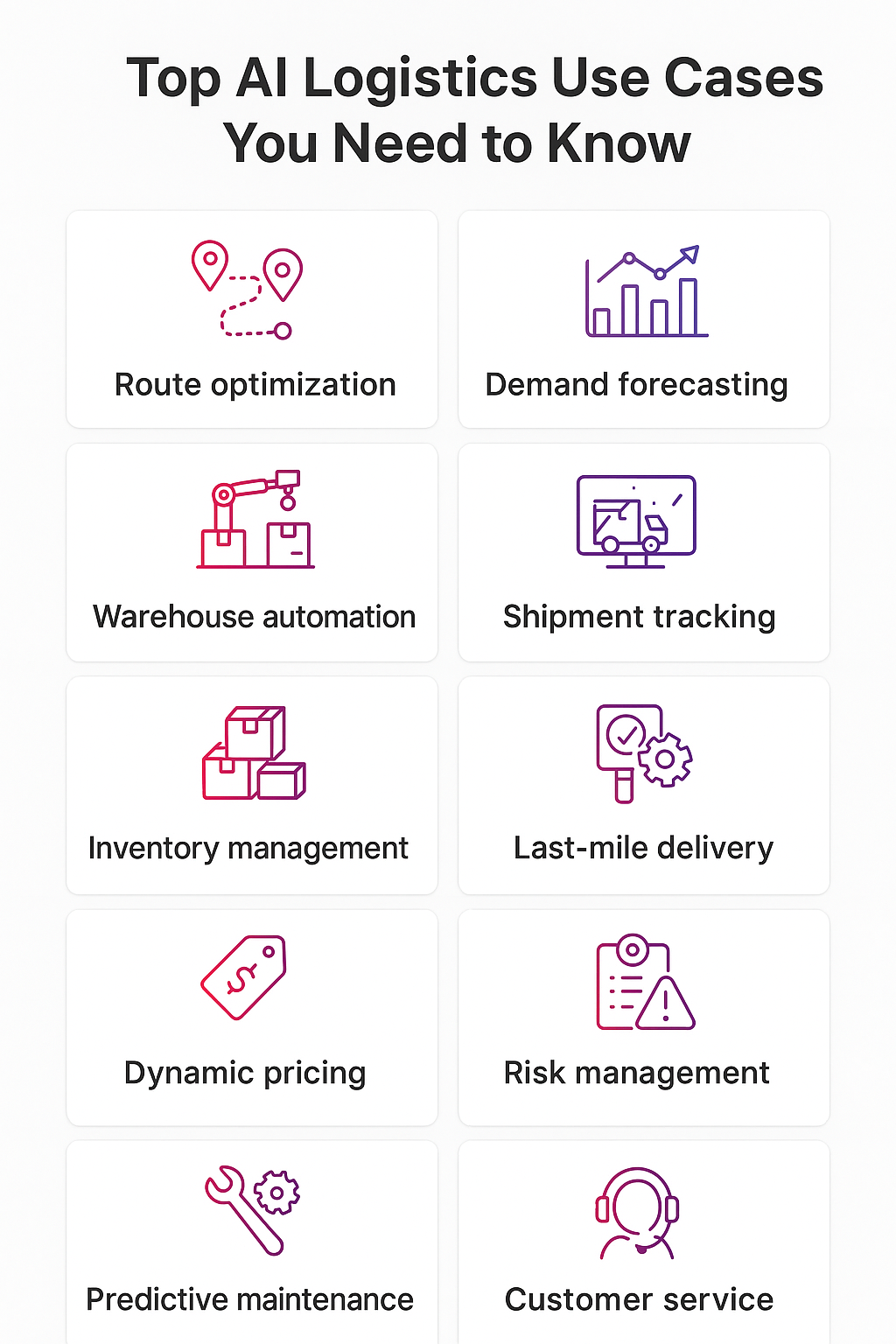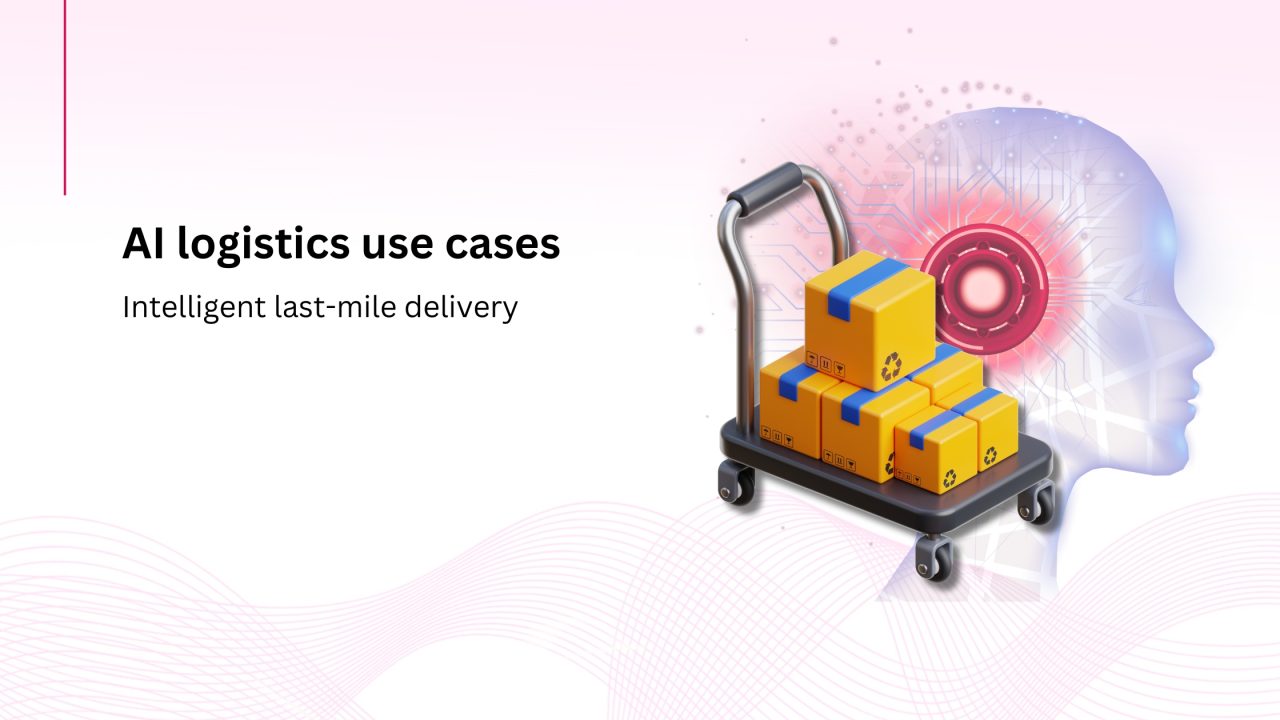Artificial Intelligence (AI) is redefining the logistics industry. With rising demands for speed, accuracy, and transparency, AI is helping logistics companies optimise operations and unlock new levels of efficiency. Whether it’s routing, forecasting, or automation, AI use cases are improving the flow of goods at every stage of the supply chain. Learn more about how AI in logistics is reshaping global supply chains in our detailed guide.
This blog explores the most important AI logistics use cases that are creating measurable impact today.
Why AI Is a Game-Changer in Logistics
The logistics ecosystem involves countless variables—from traffic and weather to fluctuating demand and warehouse availability. Traditional systems often struggle to handle this complexity in real time.
AI enables logistics operators to:
- Make predictive decisions based on real-time data
- Automate repetitive and time-consuming tasks
- Improve accuracy in forecasting and resource planning
- Respond faster to supply chain disruptions
Key AI Use Cases Driving Logistics Innovation

Route Optimisation
AI-powered systems use real-time data (traffic, weather, road conditions) to create the most efficient delivery routes—minimising delays and fuel costs.
Demand Forecasting
AI models predict future shipping volumes by analysing sales trends, seasonality, and external factors, helping logistics teams prepare inventory and resources.
Inventory Management
ML algorithms classify inventory, forecast demand fluctuations, and automate replenishment planning, reducing excess stock and stockouts.
Warehouse Automation
AI-enabled robots handle picking, sorting, and packing. Computer vision systems track inventory and spot errors to streamline warehouse operations.
Last-Mile Delivery Optimisation
AI helps select ideal delivery windows, reduces failed deliveries, and improves delivery time accuracy.
Real-Time Shipment Tracking
AI aggregates data from GPS, IoT sensors, and carriers to offer accurate, real-time visibility for customers and teams.
Predictive Maintenance
ML models monitor fleet performance, detect anomalies, and schedule maintenance before breakdowns happen.
Risk Detection and Exception Handling
AI scans supplier data, shipping logs, and global alerts to identify risks—such as customs delays or supplier non-compliance.
Chatbots and Virtual Assistants
NLP-powered bots handle customer support queries, shipment updates, and delay notifications—24/7.
Freight Pricing and Load Matching
AI dynamically adjusts freight pricing and matches shipments with available carriers to maximise load efficiency and revenue.
Real-World Examples from Global Leaders
Explore how machine learning in supply chain is driving precision and agility across industries.
- Amazon uses AI for robotic picking, same-day delivery logistics, and warehouse coordination.
- DHL leverages AI in route optimisation, predictive analytics, and chatbots.
- FedEx applies AI for smart package routing and customer support automation.
- Maersk uses AI to predict port delays and reduce empty container movements.
Business Benefits Across the Supply Chain
- Faster and more accurate deliveries
- Reduced operational and transportation costs
- Higher warehouse productivity
- Lower maintenance downtime
- Improved customer experience
- Better resource planning and scalability
Challenges and Considerations
- Data Quality: AI systems require clean, structured data to be effective.
- System Integration: Legacy systems may need upgrades to work with AI tools.
- Initial Investment: While long-term ROI is strong, upfront costs can be high.
- Change Management: Training staff and changing workflows takes time and buy-in.
How to Get Started with AI in Logistics
Also check out our insights on machine learning for supply chain efficiency to see where AI can create the most impact.
- Identify your high-friction areas (e.g., delivery delays, inventory waste)
- Choose an AI use case with clear ROI
- Start with a pilot project to validate impact
- Build or integrate with existing platforms using reliable vendors
- Monitor performance and iterate
Explore Cosnet’s AI Capabilities
At Cosnet, we develop custom AI solutions that address real-world logistics challenges—from routing engines to predictive analytics and warehouse automation.
Looking to bring AI to your logistics workflows? Get in touch or explore our portfolio of solutions.
AI is no longer optional for logistics leaders who want to stay ahead. By applying it to core functions like routing, forecasting, and automation, businesses can achieve better delivery performance, reduced costs, and scalable growth.
The logistics firms embracing AI today are setting the standards of tomorrow. Ready to join them? Let Cosnet help you lead with intelligence.
FAQs
Which AI use case delivers the fastest ROI in logistics?
Route optimisation and demand forecasting are often the quickest to implement and show measurable cost savings within months.
Is AI in logistics suitable for mid-sized companies?
Yes. Scalable AI tools can be tailored to fit the needs and budgets of growing logistics firms.
How accurate is AI-driven demand forecasting?
When trained on quality data, AI models can achieve 80–95% forecasting accuracy.
Do I need new infrastructure to adopt AI?
Not always. Many AI tools integrate with existing ERPs or WMS platforms via APIs or cloud connectors.
What are the data requirements for AI in logistics?
AI systems typically require clean, historical data on shipping, inventory, demand trends, and tracking. Additional inputs like weather, traffic, or supplier data further improve outcomes.
How long does it take to see results from AI projects?
Most companies start to see initial benefits within 3–6 months of implementation, especially in route planning, demand forecasting, and warehouse optimisation.
Is AI secure for logistics operations?
When implemented with proper cybersecurity protocols, AI solutions are highly secure. Cloud-based platforms often offer encryption, access control, and compliance features.
Can AI help reduce carbon emissions in logistics?
Yes. AI can optimise delivery routes, reduce fuel consumption, and support greener supply chain strategies by minimising unnecessary trips and warehousing costs.
What role does AI play in last-mile delivery?
AI enhances last-mile logistics through real-time tracking, route optimisation, customer communication, and delivery time prediction—improving both efficiency and customer experience.

